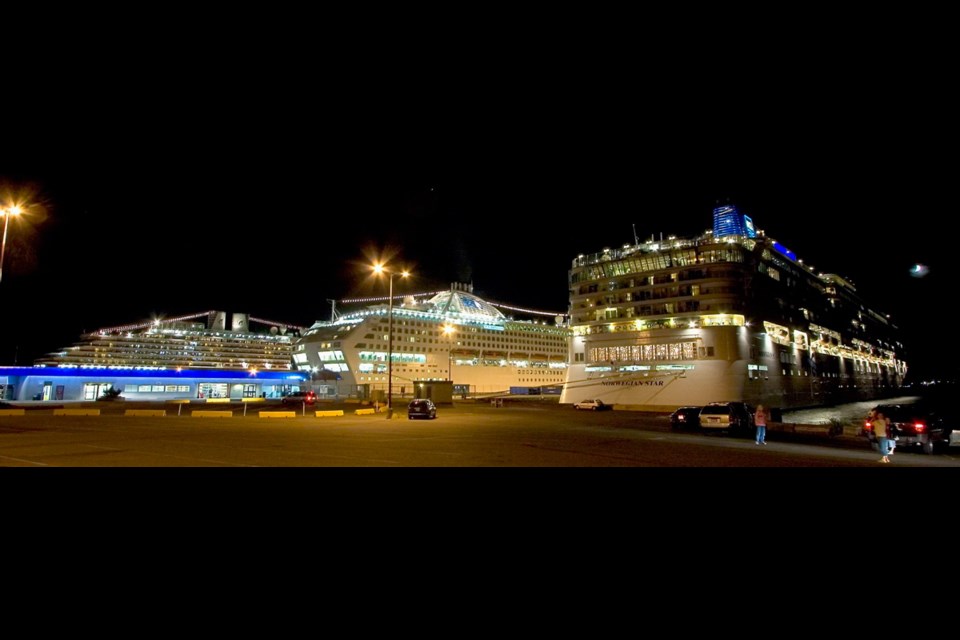The cruise industry says it’s willing to work with Victoria city council to install shore power so ships can plug into an electrical outlet instead of idling in port.
In a letter to Mayor Lisa Helps, Cruise Lines International Association identifies shore power as a “top priority” for the industry and offers to designate several key people to assist council on the issue.
“The City of Victoria is an important partner for our member companies, and we are grateful for the opportunity to share with our passengers the beauty and magnificence of your city and surrounding areas,” Charlie Ball, chair of the association’s North West and Canada region, says in the letter.
“We also understand and appreciate that we are guests in your community. Accordingly, we will continue to work hard every day to ensure the beautiful places we call, such as Victoria, remain a great place to both live and visit.”
The letter comes in the wake of a motion from Helps and councillors Marianne Alto and Ben Isitt calling on staff to investigate the city’s legal authority to regulate cruise ships while they’re in port.
Specifically, the motion questions whether the city can require ships to install shore power by a certain date in order to eliminate carbon emissions and the release of particulate matter.
In addition, the motion asks the Greater Victoria Harbour Authority to cap the number of cruise ships coming into port and refrain from signing any long-term contracts until emissions and waste issues are resolved.
The motion will be debated at a committee of the whole meeting today.
Helps said Wednesday that she had yet to see the association’s letter in response to her motion, but was glad to hear of the industry’s willingness to work with the city.
“My job is to make sure that the interests of Victorians are looked out for in an increasingly dire climate situation,” she said. “I haven’t seen the letter, but I’m glad it’s conciliatory and, absolutely, [I’m] happy to keep working with the industry on this important issue.”
Helps said the goal of her motion was to make sure the cruise industry grows in a sustainable way. Everybody seems to be in agreement that installing shore power is the way of the future, she said. “There’s been some concern about: ‘Oh, well, is this going to put local business out of business?’ Again, my job is to fight for local businesses and I want to make sure that local businesses are doing business with an industry that is sustainable over the long term.”
Greater Victoria Harbour Authority chief executive Ian Robertson said regardless of the motion’s intent, the message the industry received was: “We don’t want cruise ships anymore.”
Robertson said the industry was caught off guard and he felt the motion did not take into account the economic impact the cruise industry has on the region.
The authority estimates the Victoria Cruise Ship Terminal welcomed more than 640,000 cruise visitors and 250,000 crew members last year.
Robertson said the harbour authority intends to do what it can to pull the parties together.
“We will continue to send a message that this is about the city asking the cruise industry to consider taking additional steps beyond what they have already done,” he said.
Paul Nursey, chief executive of Destination Greater Victoria, said Helps’ motion has already had an effect on some of his members by simply suggesting the cruise industry could face changes.
“There has been a couple of small businesses, which as you know operate close to the line, who had some concerns and felt their financing could be an issue going into the off-season,” he said, noting they approached Destination Greater Victoria for help to bolster their business plans.
Nursey pointed out his organization supports much of the motion, as it wholeheartedly endorses pushing for shore power at Ogden Point and supporting sustainable tourism.
However, he said his group is concerned about the idea of not entering into any future contracts.
“Sometimes, when these things play out suddenly and so publicly, it does create some instability. Our view is the City of Victoria, the GVHA … should walk together and collaborate for a more sustainable future and that includes shore power,” said Nursey.
“The cruise lines are waking up. They have been a bit slow to the table, but they need to do their part to ensure a sustainable future.”
Marg Gardiner, president of the James Bay Neighbourhood Association, said the group was pleased to see the city taking an interest in the emissions issue. She said that instead of the city trying to adjust to the cruise-ship industry, the industry should be made to follow the city’s rules.
“We have never said get rid of it, but let’s bring it under control in this city — other cities have done it. All of our society wants to see action on greenhouse-gas emissions.”
Barry Penner, a legal adviser to Cruise Lines International and a former B.C. environment minister, said he was involved as a minister in getting shore power installed in Vancouver.
“It wasn’t as easy as you might think,” he said, noting that B.C. Hydro had to lay new underground cable to boost the power supply to Canada Place for ships in Vancouver.
He said Victoria will face similar challenges. “Is the electrical infrastructure readily adapted to this? I hope it is, but that’s something that needs to be explored. Certainly, the association wants to have those conversations and we look forward to sitting down with the harbour authority, B.C. Hydro and likely also the local government.”
Only 16 of the 1,000 ports visited by the industry association’s members are equipped with shore power, but a number of those are on the West Coast, including Vancouver, Seattle and Juneau, Alaska.



